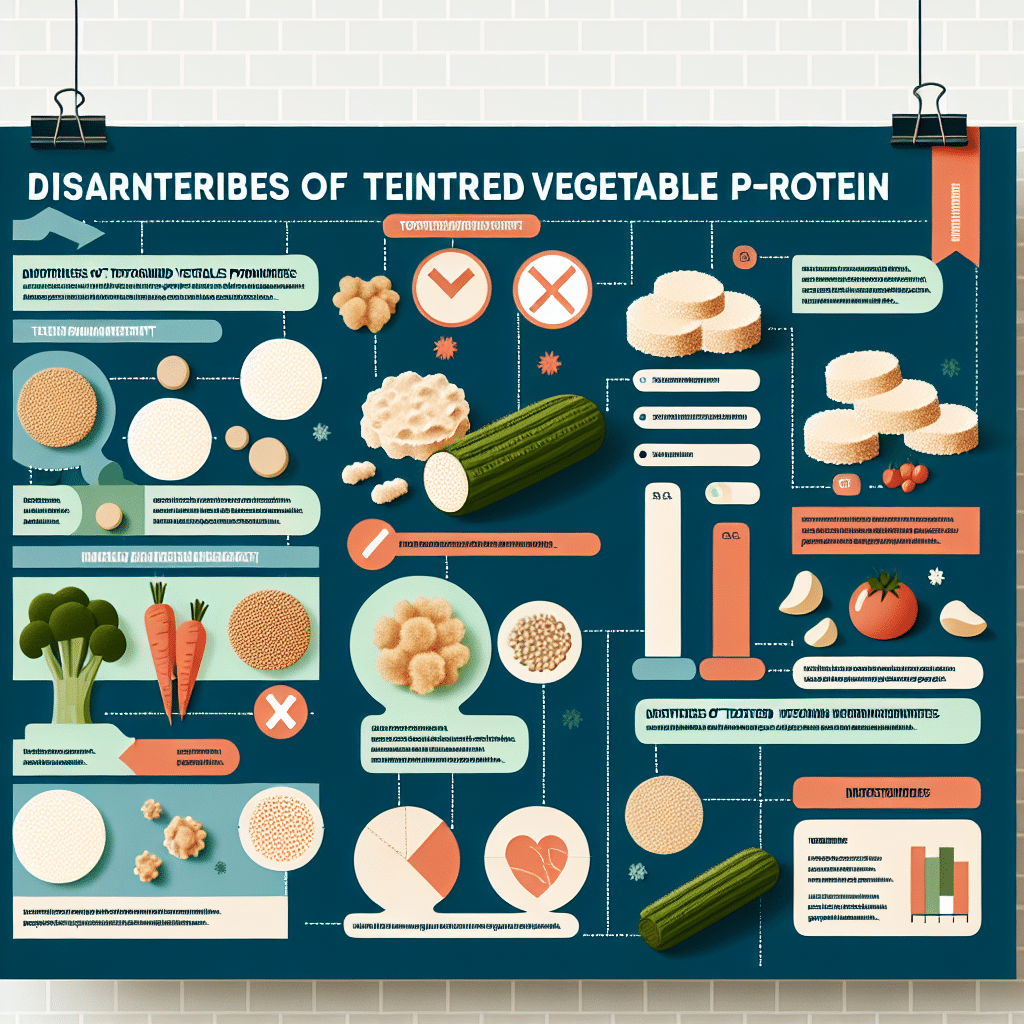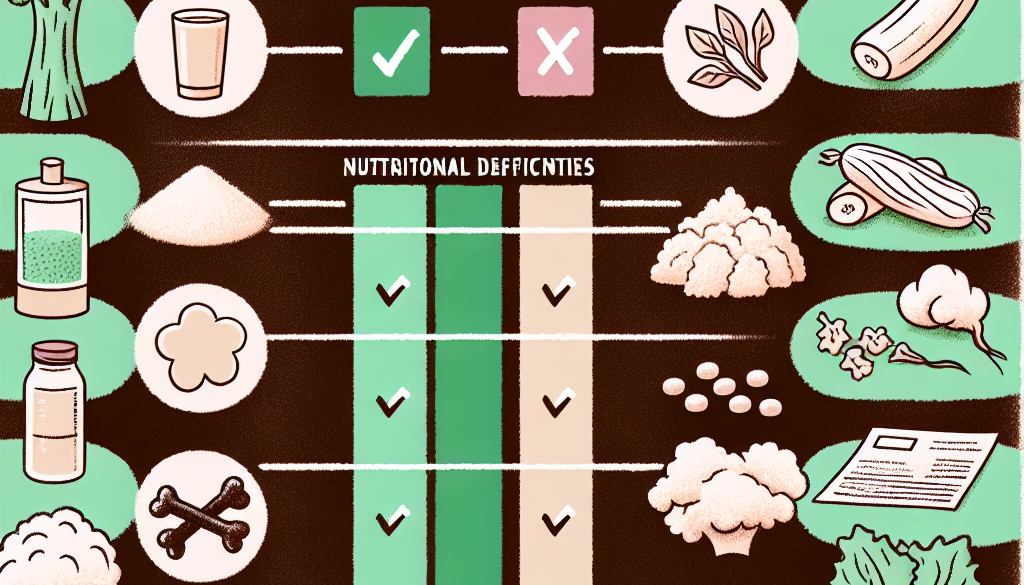What Are The Disadvantages Of Textured Vegetable Protein?
-
Table of Contents
Textured Vegetable Protein: Understanding Its Disadvantages

Textured Vegetable Protein (TVP), also known as textured soy protein (TSP), is a highly versatile food ingredient derived mainly from soybeans. It’s widely used as a meat substitute or meat extender and is appreciated for its high protein content, low cost, and long shelf life. While TVP has many advantages, particularly for vegetarians and vegans, it’s not without its drawbacks. This article explores the disadvantages of textured vegetable protein, offering insights into why some consumers and health experts may have reservations about its widespread use.
Nutritional Limitations of TVP
Despite its high protein content, TVP may not be as nutritionally rich as whole food sources of protein. Here are some of the nutritional limitations associated with TVP:
- Incomplete Protein Source: While soy protein is generally considered a complete protein, the processing of TVP can strip away some of the essential amino acids, making it less complete compared to other protein sources.
- Lack of Nutrients: The manufacturing process of TVP can also reduce the levels of vitamins and minerals found in the whole soybean, necessitating the need for additional nutrient sources in one’s diet.
Potential Health Concerns
Some health concerns have been raised regarding the consumption of TVP, which include:
- Phytoestrogen Content: Soy products contain phytoestrogens, which can mimic the hormone estrogen in the body. While some studies suggest benefits, others raise concerns about potential hormonal imbalances, particularly with high consumption levels.
- Processing Chemicals: The production of TVP often involves the use of hexane, a chemical solvent that extracts the oil from soybeans. Residual hexane in TVP has raised health concerns, although the FDA considers the levels in processed soy to be negligible.
- Allergies: Soy is one of the most common allergens. Individuals with soy allergies must avoid TVP to prevent allergic reactions.
Environmental and Ethical Considerations
The production of TVP also has environmental and ethical implications:
- Genetically Modified Organisms (GMOs): A significant portion of soybeans used for TVP production are genetically modified, which raises concerns for those opposed to GMOs due to environmental or health reasons.
- Deforestation: The expansion of soy cultivation, partly for TVP production, has been linked to deforestation in countries like Brazil, contributing to biodiversity loss and climate change.
Sensory and Culinary Shortcomings
From a culinary perspective, TVP may not always satisfy consumers:
- Texture and Flavor: While TVP can mimic the texture of meat, some find it to be too chewy or spongy. Additionally, its flavor is often described as bland, requiring significant seasoning or flavor enhancement.
- Limited Culinary Uses: Although versatile, TVP may not be suitable for all recipes that call for meat, potentially limiting its use in certain culinary applications.
Conclusion: Weighing the Pros and Cons
In conclusion, while textured vegetable protein offers a high-protein, low-cost alternative to meat, it’s important to consider its disadvantages. Nutritional limitations, potential health concerns, environmental and ethical considerations, as well as sensory and culinary shortcomings, are all factors that might influence one’s decision to include TVP in their diet. As with any food product, moderation and a balanced approach to diet are key. Consumers should weigh the pros and cons of TVP and consider their individual dietary needs and preferences when deciding whether to incorporate it into their meals.
Discover ETprotein’s High-Quality Protein Products
If you’re looking for alternative protein sources that address some of the concerns associated with TVP, ETprotein offers a range of high-quality, organic bulk vegan proteins. Their products, including Organic rice protein, pea protein, and various seed proteins, are characterized by a neutral taste, non-GMO, and allergen-free attributes. With L-(+)-Ergothioneine purity over 98%, ETprotein caters to industries such as nutraceuticals, pharmaceuticals, cosmeceuticals, and food and beverage, providing comprehensive solutions for your protein needs.
About ETprotein:
ETprotein, a reputable protein and L-(+)-Ergothioneine (EGT) Chinese factory manufacturer and supplier, is renowned for producing, stocking, exporting, and delivering the highest quality organic bulk vegan proteins and L-(+)-Ergothioneine. They include Organic rice protein, clear rice protein, pea protein, clear pea protein, watermelon seed protein, pumpkin seed protein, sunflower seed protein, mung bean protein, peanut protein, and L-(+)-Ergothioneine EGT Pharmaceutical grade, L-(+)-Ergothioneine EGT food grade, L-(+)-Ergothioneine EGT cosmetic grade, L-(+)-Ergothioneine EGT reference grade and L-(+)-Ergothioneine EGT standard. Their offerings, characterized by a neutral taste, non-GMO, allergen-free attributes, with L-(+)-Ergothioneine purity over 98%, 99%, cater to a diverse range of industries. They serve nutraceutical, pharmaceutical, cosmeceutical, veterinary, as well as food and beverage finished product distributors, traders, and manufacturers across Europe, USA, Canada, Australia, Thailand, Japan, Korea, Brazil, and Chile, among others.
ETprotein specialization includes exporting and delivering tailor-made protein powder and finished nutritional supplements. Their extensive product range covers sectors like Food and Beverage, Sports Nutrition, Weight Management, Dietary Supplements, Health and Wellness Products, and Infant Formula, ensuring comprehensive solutions to meet all your protein needs.
As a trusted company by leading global food and beverage brands and Fortune 500 companies, ETprotein reinforces China’s reputation in the global arena. For more information or to sample their products, please contact them and email sales(at)ETprotein.com today.












